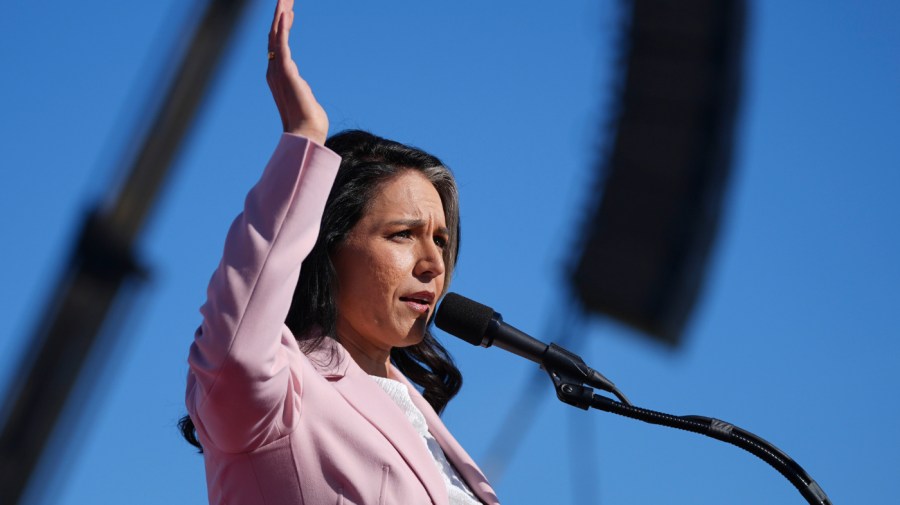
President-elect Donald Trump has nominated a remarkably unqualified person, Tulsi Gabbard, to be the director of National Intelligence. The Senate should reject her nomination, but also strengthen oversight of the Office of the Director of National Intelligence by conducting, with the House, a review of the office to strengthen its effectiveness and capacity in meeting the national security challenges of the coming decades.
The day after the election, Trump released a video claiming the U.S. government’s national security agencies have been “weaponized “ and that he “will be completely” overhauling them. A week later, he announced he would nominate Gabbard to be the director of National Intelligence, a position that oversees and coordinates all the agencies that comprise the U.S. intelligence community.
In the wake of the 9/11 attacks and the Iraq weapons of mass destruction fiasco and to prevent similar disasters in the future, Congress established the Director of National Intelligence position and office with the Intelligence Reform and Terrorism Prevention Act of 2004.
The act states specifically: “Any individual nominated for appointment as DNI shall have extensive national security experience.” It also requires the director to provide national intelligence that is timely, objective and independent of political considerations.
Gabbard, a former congresswoman from Hawaii, has been a member of that state’s National Guard and is currently a lieutenant colonel in the Army Reserves. She has been deployed overseas.
She has no background in intelligence, nor has she had any experience as an executive responsible for large organizations with substantial budgets and complex national security agendas that need to plan and budget years in advance to develop and deploy new technical capabilities.
She does, however, have a history of repeating Kremlin-sourced conspiracy theories about Ukraine and Syria, and of supporting autocrats, such as Syria’s former leader, Bashar Assad.
She also has links to an Indian-based group that actively supports Indian Prime Minister Narendra Modi’s foreign and domestic policies.
Given Gabbard’s lack of the experience required by law for the job and her history of adopting foreign perspectives on issues important to the U.S., she seems an odd choice to oversee Trump’s desire to “overhaul” U.S. intelligence and other national security agencies.
This raises the question of whether Trump wants to make these agencies more effective in providing facts to policymakers or make them subservient to him and his views of global developments, despite the IRTPA’s stipulation that U.S. national intelligence shall be independent of political considerations.
The Senate Select Committee on Intelligence has a history of effective and bipartisan oversight of the intelligence community. That bipartisan approach will be needed to ensure those confirmed for senior intelligence community leadership positions in the Trump administration are up to the job and that any “overhaul” makes it more effective in meeting the coming challenges from other countries and exploiting rapidly changing national security-related technologies, not telling policymakers what they want to hear.
Accordingly, if the Senate’s leadership cannot convince Trump to put forward a DNI nominee with the experience required for the job, then the Select Senate Committee on Intelligence should reject Gabbard’s nomination. But in rejecting the nomination, it, in coordination with the House Permanent Select Committee on Intelligence, should launch an overdue review of the Office of the Director of National Intelligence and its role in leading and coordinating the U.S. intelligence community and supporting policymakers in the other national security agencies.
Two decades have passed since the director’s position and office were established. There are lessons to be learned from a disciplined look at what has gone right and what has not worked well during that time — as well as what needs to change to ensure that this office and the rest of the intelligence community are capable of dealing effectively with an increasingly dangerous and complex world. The results of this bipartisan congressional review would add up to an “overhaul” for which Trump could claim credit.
Americans have learned the hard way that intelligence failures can lead to a high cost in blood and treasure. We cannot afford any more 9/11s or WMD in Iraq mistakes. Our intelligence community needs capable, seasoned leadership and engaged congressional oversight.
Congressional rejection of Tulsi Gabbard’s nomination as DNI, coupled with a detailed review of how the Office of the Director of National Intelligence has been functioning and what changes are needed in it, will ultimately be a win-win for the American people and for Trump.
Kenneth C. Brill is a retired foreign service officer who served as an ambassador in Republican and Democratic administrations and was the founding director of the U.S. National Counterproliferation Center within the Office of the Director of National Intelligence.












